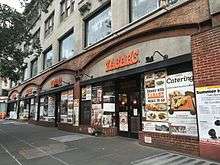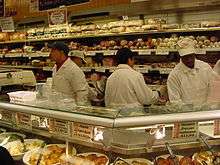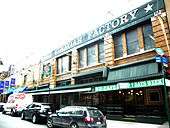Zabar's
Zabar's (/ˈzeɪ.bɑːrz/ ZAY-barz) is a specialty food store at 2245 Broadway and 80th Street, on the Upper West Side of Manhattan in New York City, founded by Louis Zabar and Lillian Zabar. It is known for its selection of bagels, smoked fish, olives, and cheeses (see appetizing store).
 Logo | |
| Industry | Specialty market |
|---|---|
| Founded | 1934 |
| Founders | Louis Zabar Lillian Zabar |
| Headquarters | New York City, New York, U.S. |
Key people | Louis Zabar Lillian Zabar[1][2] |
| Services | Eatery |
| Website | zabars |

History

Louis Zabar (1901–1950) came to the United States through Canada from Ukraine, Soviet Union, in the early 1920s. His father, also a merchant, had earlier been murdered in a pogrom in Ukraine. Louis first lived in Brooklyn, where he rented a stall in a farmer's market. He married Lillian Teitlebaum (1905–1995) on May 2, 1927, and they had three children: Saul Zabar (born in 1929); Stanley Zabar; and Eli Zabar. Lillian had come to America by herself and settled with relatives in Philadelphia. She moved to New York City and met Louis Zabar, whom she knew from their village in Ukraine. Louis Zabar died in 1950 and was then the owner of 10 markets. After the death of Louis, Lillian married Louis Chartoff (1900–1978).[3][4] From 1960 to 1994, brothers Stanley and Saul Zabar partnered and co-owned Zabar's with Murray Klein, who joined the store in 1953, but was not a member of the Zabar family.[5][6] Klein officially retired from the store in 1994 and died on December 6, 2007, in New York City.[5]

Importing the Wigomat and other drip coffee makers in the late 1960s, Zabar's was the first shop selling these machines in the USA. As of 2006 Zabar's is headed by Saul Zabar as the president and co-owner. He was attending the University of Kansas when his father died. Stanley Zabar is the vice president and a co-owner. He was a student at Horace Mann School and later the University of Pennsylvania the year his father died. Their brother Eli Zabar has his own line of specialty shops which includes the Vinegar Factory, on East 91st Street near York Avenue, and E.A.T., at Madison Avenue near 80th Street. A move and expansion in the 1970s made Zabar's one of the largest supermarkets in Manhattan.[4]
Lobster salad controversy
In 2011, Zabar's briefly got nationwide attention from news outlets when a reporter for New Orleans' Times-Picayune observed that the store's product labeled "Lobster Salad" actually contained no lobster.[7][8][9][10] The New York Times reported that the store "charged $16.95 a pound" for the seafood spread made mostly of salted crawfish and mayonnaise.[8] Maine's Bangor Daily News said a Maine Lobster Council director advised Saul Zabar "of the federal regulations that make deliberate misbranding of food products a serious violation" and that the "Food and Drug Administration permits the use of the term lobster without qualification only for the Homarus species, which includes the European and American lobsters.... labeling other species... as 'lobster' without qualification would cause the product to be misbranded in violation of the Food, Drug, and Cosmetic Act."[9] The New York Times said "the lobsterless lobster salad" was sold at Zabar's for 15 years and that Saul Zabar insisted that he had not meant to deceive anyone.[8] A photo published in Gothamist showed that the product's deli-label ingredients list made no mention of lobster; the word lobster only appeared above the ingredients in the large print all caps product name, "LOBSTER SALAD *WITH A BAGEL OR A ROLL* ".[10][11] After the media attention, Zabar's combined the product's name with the store name and relabeled the spread Zabster Zalad.[8][10]
Cultural references
Zabar's is frequently referenced in popular culture. It is mentioned in the 1998 films You've Got Mail and Return to Paradise, the 2009 TV series V, and episodes of Northern Exposure, Will & Grace, Dream On, The Green Inferno, How I Met Your Mother, Mad About You, Friends, Sex and the City, The Nanny, Seinfeld, The Simpsons, The West Wing, Studio 60 on the Sunset Strip, 30 Rock, The Daily Show, The Colbert Report, Hart of Dixie, Castle, Episodes, Pardon the Interruption, Law & Order, Saturday Night Live, Real Time with Bill Maher, Gossip Girl, and Broad City.
- In Season 1, Episode 1 of The Marvelous Mrs. Maisel, Miriam Maisel asks satirically, "what am I supposed to do, go buy one [a husband] at Zabar's?"
- In Season 3, Episode 4, Miriam Maisel says sardonically of actress Kim Novak, "I run into her at Zabar's all the time." Joel Maisel responds, "But does she ever dab her lipstick at Zabar's?"
- In Season 5, Episode 6 of Broad City, the protagonists visit Zabar's to look for a lost relative as it was a place with pickled herring.
- The music video of Vampire Weekend's Sunflower is filmed in Zabar's [12]
See also
References
- "West Side Rag » UPPER WEST SIDE ESSENTIAL EATS: ZABAR'S". www.westsiderag.com. Retrieved March 25, 2018.
- Scelfo, Julie (October 25, 2016). The women who made New York. Heald, Hallie. Berkeley, California. p. 278. ISBN 978-1580056533. OCLC 960644058.
- Stout, David (December 23, 1995). "Lillian Zabar, Co-Founder of Quintessential Deli". The New York Times. Retrieved July 21, 2007.
Lillian Teitlebaum Zabar, who fled the pogroms of her homeland, went to the United States and became part of an American success story, died yesterday in Manhattan. She was 90, or perhaps 92 or 93. Mrs. Zabar was a founder with her husband, Louis, of Zabar's gourmet delicatessen and food emporium on Broadway at 80th Street in Manhattan. The business was started in 1934 in Brighton Beach and now has about 35,000 customers a week and $40 million in sales a year, her sons Stanley and Saul said last night.
- Gray, Christopher (November 10, 2002). "Zabar's, Broadway Between 80th and 81st Street; As Its Horizons Widened, It Never Left Home". The New York Times. Retrieved July 21, 2007.
According to Saul Zabar, his father, Louis, was born in 1901 in the Ukraine and came to the United States through Canada in the early 1920s. That was after Louis's father, a merchant, was murdered in a pogrom. Louis Zabar first lived in Brooklyn, and he soon rented a stall in a farmer's market. In 1941 he opened a store in the third building north from 80th in the old Calvin Apartments, which was by that time a hotel. He gradually built a network of other small markets, and when he died in 1950 he owned 10 Manhattan stores.
- Moskin, Julia (December 7, 2007). "Murray Klein, Who Helped Build Zabar's Into Food Destination, Dies at 84". The New York Times. Retrieved February 3, 2008.
- "Murray Klein, Manhattan deli owner who gave Americans a taste for quality foods". The Times. London. January 17, 2008. Retrieved February 3, 2008.
- Doug MacCash (August 1, 2011). "In New York City a lucky crawfish can become a lobster". The Times-Picayune. New Orleans. Retrieved September 7, 2011.
- James Barron (August 30, 2011). "Zabar's New Non-Lobster Z-Food". The New York Times. Retrieved September 7, 2011.
- "No Fake Lobsters Allowed". Bangor Daily News. Bangor, Maine. September 7, 2011. Retrieved September 7, 2011.
- Garth Johnston (August 11, 2011). "Zabar's 'Lobster' Salads Aren't Made With Lobster". Gothamist. Archived from the original on December 25, 2014. Retrieved September 7, 2011.
- Rebecca Marx (August 12, 2011). "Zabar's Turns to Wikipedia to Defend Its Definition of "Lobster Salad"". The Village Voice. Retrieved January 11, 2011.
- https://gothamist.com/arts-entertainment/shoppers-kvetch-while-jonah-hill-directs-vampire-weekend-music-video-at-zabars-in-peak-upper-west-side-moment